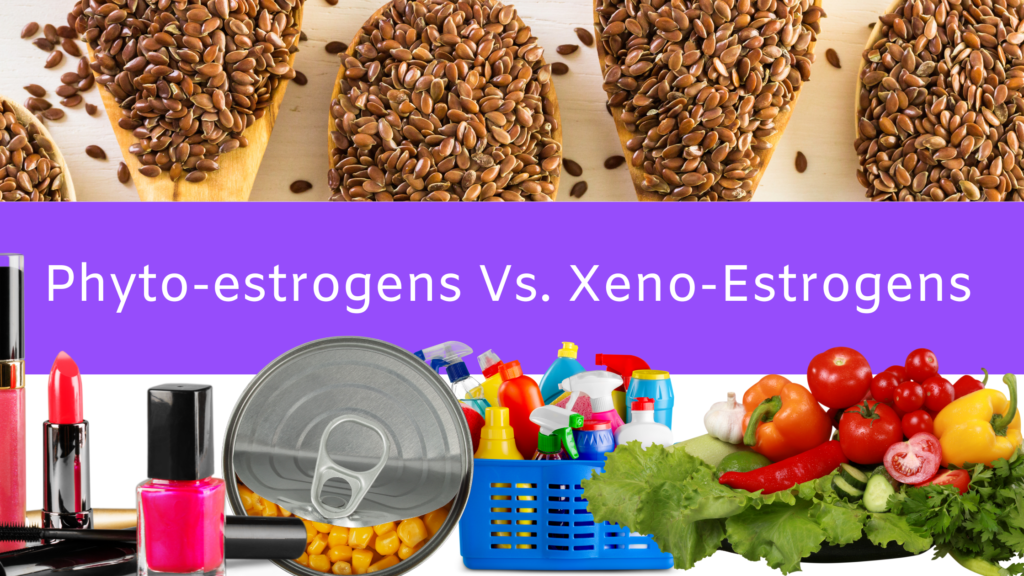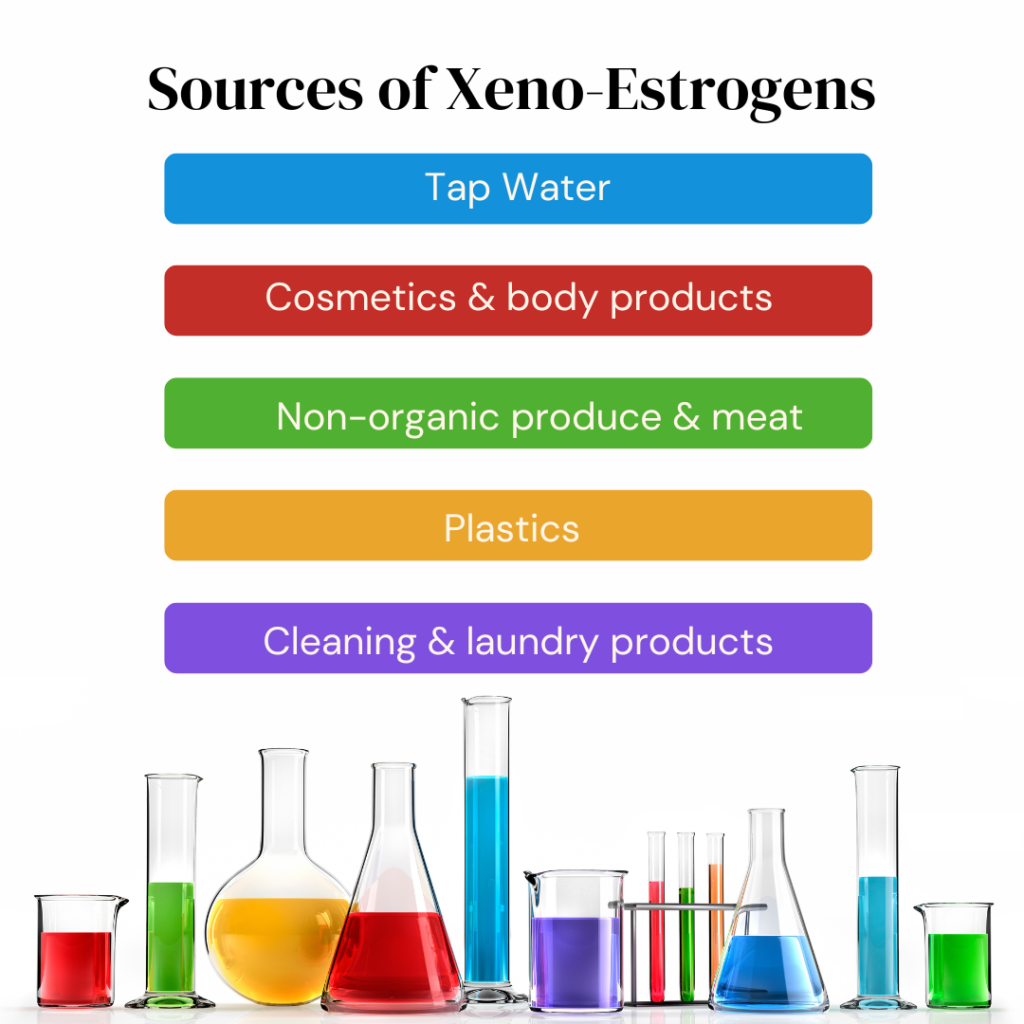

Navigating the complex world of estrogen and breast cancer can be incredibly confusing. Estrogen can range from naturally made in the body to phytoestrogens from plants and xenoestrogen pesticides sticking to your strawberries. This blog post aims to clarify the different types so you can stay balanced, happy, and healthy! Before I go further, here are the three types of estrogen that your body naturally produces:
- Estrone (E1): Made in your ovaries, and is the only estrogen hormone you produce after menopause, just in reduced amounts.
- Estradiol (E2): Also made in your ovaries, but only during your reproductive years. It is the most potent form of estrogen.
- Estriol (E3): This is the primary form of estrogen during pregnancy, and the placenta produces it. This is the more “protective” of all the estrogens.
Next up, the main points on our agenda today are phytoestrogens and xenoestrogens.
Phytoestrogens
Phytoestrogens are plant estrogens that are safe to eat and very helpful in healing from cancer. Phytoestrogens contain only 2% of the potency of human estrogens. They are often called “gentle estrogens” because of their healing (rather than carcinogenic) effects. They also help fill receptor sites with milder forms of estrogen. And they help flush out truly dangerous chemically-created xenoestrogens (more on those soon) from the body.
Flax seed is a phytoestrogen that inhibits the growth of estrogen-dependent breast cancer and even strengthens the effects of tamoxifen. It can also:
- Can cause cancer cells to self-destruct. They inhibit the growth of the blood vessels that feed breast cancer tumors. They also contain a cytotoxic substance called Justicidin B which causes apoptosis (cancer cell death) in human breast cancer cell lines.
- Flax seeds stop cancer cells from spreading. They can slow down cancer metastasis. The process is called SERM (Selective Estrogen Receptor Modulation). SERM can lower estrogen in one area of the body (such as the breast) while increasing it in another, such as the brain and bones.
Flax seed recipes 
Eating flax seeds can actually be something you crave with these decadent and creative recipes! Please remember never to buy pre-ground flax seeds, as the shelf life and packaging can cause oxidation and mold in the seeds. For breast health, consume up to 25 grams per day (5 teaspoons).
Soy
Soy, yes (fermented and whole) soy, reduces the number of ER-a (estrogen receptor alpha) sites on cells. Fewer ER-a sites mean fewer places for super-aggressive estrogens to land and less opportunity for ER-positive cancer cells to grow. So eating fermented, whole soy – not isolates from soy like isoflavones (soybeans) can help slow down the growth of ER-positive cancers. The best way to do this is by eating organic miso paste, natto, tempeh, edamame, pickled tofu, and Haelan.
Haelan is a concentrated organic, non-GMO fermented soy drink. I believe Healen’s ability to inhibit breast cancer stem cells and induce breast cancer cell death was instrumental in my healing journey. Admittedly, it tastes awful, but adding chocolate stevia makes it so much better!
Examples of soy products that you should NOT eat are the following: soy yogurts, highly processed “imitation meats,” soy protein powders, and so forth. “Just as other processed foods are lower in nutrient density, removing the protein from the other enzymes and bacteria needed for digestion affects the nutritional quality,” says Taz Bhatia, MD, integrative health expert and author of What Doctors Eat.
In summary, if it is highly processed and filled with things you can’t pronounce – don’t eat it – regardless of what it is.
Xenoestrogens

Xenoestrogens are the opposite of phytoestrogens. They are “foreign estrogens” that imitate aggressive estrogens (mainly estradiol) and take up vital space in the body’s mammary tissue estrogen receptor sites. These potent chemicals are powerfully dangerous, and research has found high levels in many breast cancer tumors. This is because they are toxic chemicals that will masquerade as hormones in your body and wreak havoc on hormonal balance, which can lead to breast cancer.
To detangle some of the confusion, keep reading to learn key insights on xenoestrogens and why and how to stay far away! For further research, please review these blogs if relevant to your journey:
- Aromatase Inhibitors (Aromasin, Anastrozole, and Letrozole) for postmenopausal women with ER-positive breast cancer.
- Balancing your Eq ratio: Learn what the Estrogen Quotient Ratio is, why it is important to know, and how to test it.
- Bioidentical Identical Hormones: Get accurate info to make your best decisions on a healthy breast journey.
Xenoestrogens can be found in pesticides in your produce (get the EWG.org Dirty Dozen Guide), herbicides, tap water, plastics (for example: drinking from plastic water bottles or heating plastic Tupperware in the microwave), bleach byproducts, refrigerants, etc.
For the last few decades, there has been increasing evidence of the health dangers of chemical toxins. If you are on a Healthy Breast journey (or committed to a healthy, toxin-free lifestyle), avoid these common, everyday sources of xenoestrogens.
Methylation can reduce harm from xenoestrogens
I’m a woman of solutions, so I was thrilled to learn about the methylation process during my first healing journey. In simple terms, here is how methylation works. Imagine how spark plugs work in a car. Some “plugs” cause certain chemical reactions to occur. Methylation in your body is similar to spark plugs converting simple chemical elements (carbon and hydrogen) into literally hundreds of different functions in your body. Some of these functions include repairing DNA, proper immune system function, detoxification (especially of the liver), and gene expression.
Most importantly for reproductive and hormonal health, methylation can cause certain hormones and proteins to shift into completely different substances (serotonin to melatonin, for example). When methylation is not occurring or is off in some way, healthy genes can be turned “off,” and unhealthy ones can “turn on.”
Not surprisingly, cancer cells tend to have abnormal methylation processes. When methylation processes work correctly, they can change xenoestrogens and other “aggressive” estrogens into milder forms. Unfortunately, traditional doctors rarely address methylation, making it a seriously overlooked piece of the breast cancer puzzle. If you have experienced obesity or painful menstrual periods, estrogen methylation may be an issue. To find out if you have a genetic weakness that prevents you from methylating properly, there are different types of tests that can determine if you have an issue, (DNA, blood test, and urine test).
5 daily actions that will help your estrogen methylation processes:
- Reduce Your Toxic Load. Obviously – start at the source!
- Balance stress and maintain a healthy lifestyle.
- Include flax seeds in your diet. Flax seeds are high in lignans, a powerhouse substance that mimics naturally-occurring mild forms of estrogen and will take residence at mammary area cellular receptor sites in lieu of xenoestrogens.
- Support your liver. The liver’s main job is detoxification and is heavily interconnected with methylation, especially the conversion of certain substances like folate to glutathione, one of the most powerful antioxidants in your body. An effective action to support your liver is to administer a coffee enema at least once a week (more if you are on a breast cancer healing journey). Phytochemicals kahweol and cafestol in coffee can activate glutathione and promote cellular detoxification.
- Targeted supplementation. Some supplements that target methylation include Methyl Support, Brocco Power, and Haelan.
Turn Fear Intro Freedom!
Navigating the complex world of estrogen and breast cancer can be incredibly confusing. New and hard-to-say words, such as phytoestrogens and xenoestrogens, are entering your vocabulary, and their concepts seem tangled up. On top of everything thrown at you, the shock of breast cancer is still making its way around your mind. This is why I started the Breast Cancer Conqueror Coaching Program! A personal coach will help you every step of the way and curate custom protocols for your specific journey. You never have to fear breast cancer again!